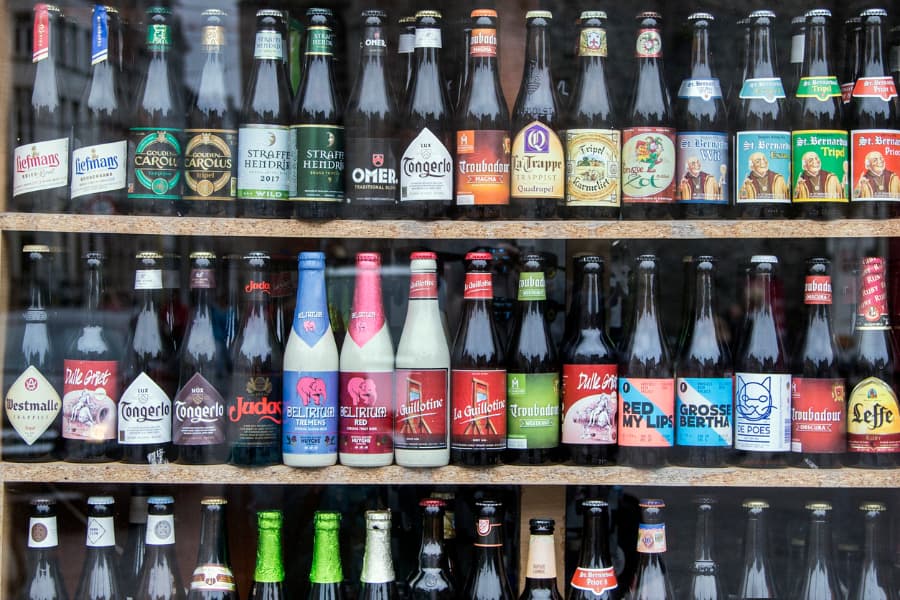
Good beer doesn’t happen by accident. Dedicated brewers orchestrate a complex combination of flavor notes and ingredients. As a beer aficionado, you then consider all the choices and select the styles and brands that suit your tastes. With this effort invested, there is one element that gets neglected. What do you really know about aging beer? Is aged beer different depending on whether it’s a sour, ale, stout, or IPA? How long does beer last in and out of the fridge?
Whether enjoying Columbia Distributing’s beers in Oregon or Washington, you’ll want to know the best timelines and ways to keep beer at its best. Here, we take a closer look at some best practices for aging beer.
Optimum Ways to Store Beer
The taste of a beer makes all the difference. Maximize your taste experience by storing beer correctly. Generally speaking, any beer is best when consumed within six months of being purchased. To maintain the strength of flavor, an optimum temperature for beer is between 50 and 55 degrees Fahrenheit. Of course, not all beers are made alike, and neither are temperature recommendations for various types of beer. Check the list below for a more precise level of cooling:
- IPAs: 45 to 50 degrees Fahrenheit
- Stouts: 45 to 55 degrees Fahrenheit
- Sours: 50 to 55 Degrees Fahrenheit
- Ales: 55 to 60 degrees Fahrenheit
Know Your Beers
When it comes to figuring out if a beer can be stored and aged for a long time, it’s important to remember that not every beer is the same. Knowing about the different varieties can make it easy to understand their properties to ensure perfect storage and thus optimum drinkability.
Sours
Sour beers are a style made specifically to have high levels of acidity. Instead of being unintentionally sour, these beers offer a flavorful type of sour that can bring a pleasant pucker to your lips. Sour beers are best served between 45 and 50 degrees Fahrenheit. This temperature eases the stronger acidic notes, delivering a smoother drinking experience. With this acidic quality, sour beers age well and do not go bad as quickly as other beers. When stored properly in a dark place that doesn’t have large temperature swings, sour beers can be aged in bottles for years. Their flavor may change over time. For example, a sour beer stored for five years may have a more fruit-forward flavor than it did when it was freshly bottled.
Stouts
Stouts are unmistakable for their rich, dark color. They have a milky texture and can have flavors of chocolate, oatmeal, coffee, and more. The creamy, slightly bitter flavors are best enjoyed within six months of purchase, but like sours, stouts in bottles can be aged for much longer.
Ales
Ales are usually quite flavorful with robust and complex flavors. Another characteristic of ales is that they can be fruitier and more aromatic. Ales are one of those oldest types of libations, dating back 4,000 years. Depending on the brand and type of ale, some can be stored for years. Typically, brown ales with higher alcohol content are safe to age for longer periods.
IPAs
India Pale Ales are all about the hops. Their strong flavor is determined by the specific hops used by the brewer, offering bold, refreshing, bitter, or crisp results, along with a distinct aroma. IPAs are another beer not meant for aging, meaning you should drink your IPA within a few weeks.
Light Beers
Light beer is usually a pale lager that has reduced calories or alcohol content when compared to full-bodied traditionally-brewed beers. Think Coors Light or Budweiser. These are beers that aren’t designed to be stored for longer periods of time. Typically, a light beer should be consumed within four months of purchase.
What Makes Beer Go Bad?
Maintaining your beer at the desired temperature is always considered best practice. Leaving beer out, however, does not necessarily lead to a terrible fate. Contrary to popular belief, beer left out of the refrigerator is not what leads to a foul smell, what some people call “skunky.” What actually causes bad beer smell is light – not heat. Light causes a chemical transformation that releases sulfur from the hops, leading to a smell similar to a skunk’s spray. Thus, if your beer is stored in a dark spot, such as a closet or corner of your basement, you do not run the risk of ruining your beer.
Savor Your Favorite Aged Beers Without Worry
Now that you know these basic guidelines on which styles of beer can be aged and which ones should be enjoyed within months of bottling or canning, the best way to determine how a beer will age is to experiment on your own. For example, take some stouts from a case and store them in a dark place, and then pull one out every year to see how the flavor has changed.
From domestic beers to imported and non-alcoholic selections, Columbia Distributing has something for everyone and can help you explore the different styles of beer. Contact us for more information on our more than 250 beers and nearly 60 non-alcoholic brands.